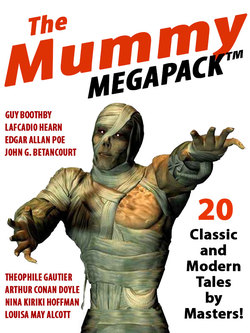Читать книгу The Mummy MEGAPACK® - Lafcadio Hearn - Страница 5
На сайте Литреса книга снята с продажи.
ОглавлениеSYMPATHY FOR MUMMIES, by John Gregory Betancourt
I brushed dust from my eyes, then zippered the tent’s flap shut. The wind was coming up again, sighing through our camp. It was a sound I had grown used to over the last two months.
“Everything locked up?” asked Linda, my wife.
“Yep,” I said. As director of the excavation, I had to make sure everything was put away before I turned in. Stretching sore muscles, I peeled off my dust-and-sweat-impregnated shirt, then washed up in a basin. “We’re getting close,” I said.
We were excavating the tomb of Atenkham, a court official in Egypt’s Valley of the Kings. Tomorrow we would reach his burial chamber. There was little chance of riches; Atenkham hadn’t been a king. But artifacts were gold, metaphorically, to archaeologists.
“Still not worried about the curse?” Linda asked.
“What Egyptian tomb doesn’t carry a curse?” I asked with a laugh. I toweled off, then leaned over and planted a kiss on her full red lips. “Besides, curses only apply to big rich tombs when the moon is full and you haven’t said your prayers by night.”
“Mmm.”
“So I get my movies mixed up.” I crawled into my sleeping bag, exhausted. It was nearly midnight. I’d be up in five hours.
“Besides,” I muttered, “what kind of curse could a bureaucrat muster?”
* * * *
At dawn the next morning, I was ready for work. Although this was my seventh tomb, I still felt a mounting sense of excitement.
I had dreamed of Atenkham’s mummy. I saw priests removing his organs and preserving them in jars. I saw them filling his veins with embalming fluids and carefully wrapping his body in layers of white cotton swathing. But mostly I had seen papyrus scrolls, thousands of them, the life’s work of this ancient Egyptian bureaucrat. Those scrolls were the sort of treasure I sought.
Now I would see what truth lay in my dream.
My grad students were sitting our breakfast table with someone. I sighed when I recognized Mr. Abdul from the Department of Antiquity. He was in charge of excavation permits.
“Mr. Abdul,” I said to him, “what brings you here?”
“Paperwork, Mr. Jones,” he said in his succinct British accent. He passed me a sheaf of papers.
“What’s this?”
“New regulations go into effect this morning,” he said. “First of the month. I told you last week, as you may recall.”
“Yes, yes,” I said. He had mentioned something of the sort.
“If you would fill it out, please.”
I stared at the forms. None were in English, of course.
“This will take me hours,” I said. I glanced over at the tomb. We were so close —
“Paperwork,” he said, “must be done properly. I shall leave you to it.” He crossed to his Jeep, got in, and drove off in a cloud of dust.
“Shall we start anyway, professor?” Neal Jameson asked me. He was a young, eager, promising grad student.
“No,” I said, imaginary bandages tightening around my chest and throat. “Mr. Abdul doesn’t like me. If we begin without the paperwork, we’ll be shut down.”
“He can’t —”
“He can,” I said.
* * * *
My Arabic was lousy, and making sense of the application was a dense process, even with an interpreter. This, I thought at one point, is the curse of Atenkham: buried alive in paperwork.
I kept thinking of his mummy, swathed in hundreds of yards of cloth, surrounded by scrolls, laughing at me.
* * * *
Picketers arrived at two o’clock. They stood outside our camp waving signs: “Egyptian Tombs for Egyptian Archaeologists” and “No Foreign Digs!” It was an old dispute. Foreigners received more excavation permits than Egyptian archaeologists.
Promptly at three o’clock, Mr. Abdul returned. He had two men in uniforms in his jeep. When Abdul gave the picketers a nod, I felt Atenkham’s door slam shut in my face.
“Your papers,” I said numbly.
He barely glanced at them. “Permit denied,” he said. He stamped the documents in red ink.
“Why?” I asked.
“Improperly filled out. And an objection has been raised.”
“Them?” I gestured at the picketers. “You sent them here!”
“Me, Professor?” He raised his eyebrows, feigning indignation. A cheer went up from the picketers as the guards took positions near the tomb entrance.
“And so,” I whispered bitterly, “the curse is made true.”
“That’s it?” Neal Jameson demanded, looking from Abdul to me, shock and outrage on his face.
“Afraid so,” I said. “The curse wins out.”
“He can’t —”
“He did,” I said.
Mr. Abdul smiled.
Atenkham must have been like him, I thought to myself.
I knew, suddenly, why pharaohs buried their bureaucrats.
